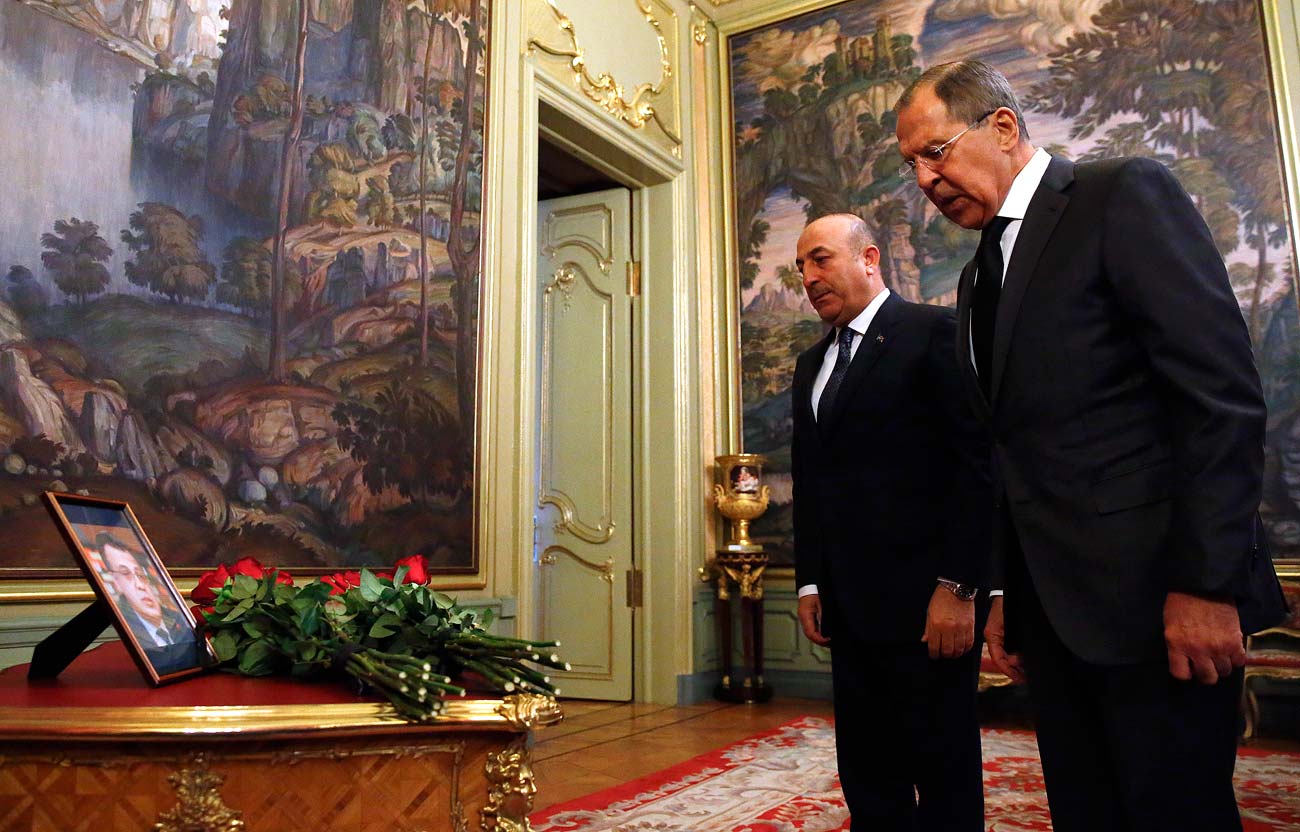
Russian Foreign Minister Sergei Lavrov (R) and his Turkish counterpart Mevlut Cavusoglu attend a ceremony in memory of murdered Russian ambassador to Turkey Andrei Karlov before their talks in Moscow, Russia.
ReutersFollowing the shooting of Russian Ambassador to Turkey Andrei Karlov in Ankara on Dec. 19, the Russian mass media is condemning Turkey's security structures for their unprofessional protection of a Russian representative, but insist that the ambassador's assassination will not worsen Russian-Turkish relations.
The obvious culprit in the tragedy, besides the assassin himself, are Turkey's security organs, police and special services. They were the ones whose duty it was to organize protection for a high-ranking official.
The assassin was allowed to freely enter the Center of Modern Art in Ankara, which was hosting a photo exhibition. The young man in a suit and tie was believed to be a guard. He showed his police ID, which he had kept after being dismissed from the law-enforcement organs on suspicion of taking part in the coup d'état on July 15, reports the Russian business daily Kommersant, stressing that Turkey was unable to organize a sufficient level of security during the event.
"The level of vigilance is always heightened but I think that it was still not an 'orange' level, that is, extreme. There were no additional guards. The event appeared to be a routine event. It's not even clear who organized it," ex-ambassador to Turkey Pyotr Stegny told the Izvestiya newspaper.
Public opinion on the motives for the assassination of the Russian representative is similar to the view of the Russian foreign ministry, which has already called the murder of the ambassador a terrorist act.
Karlov's assassination may have a double goal. On the one hand, this demonstrative act punishes Moscow for its involvement in the Syrian conflict on the side of Syrian leader Bashar al-Assad, whom Sunni radicals consider their worst enemy. Therefore it would be easy to explain why the terrorist shouted "Allahu Akbar" – the assassination of the Russian ambassador for the organizers was an operation that was part of a religious war, a worldwide jihad, writes Kommersant.
On the other hand, it is hardly a coincidence that the assassination occurred in Turkey. Ankara and Moscow's reconciliation was the decisive factor in the changes that have taken place on the frontlines of the Syrian war in the last few months. It was precisely the agreements between the Russian and Turkish presidents (which were not always publicized) that determined Aleppo's fate. In Aleppo the anti-government opposition suffered its worst defeat in the four-year conflict, explains Kommersant.
Experts interviewed by news media outlet Life differ in their opinions on who would benefit from the assassination, which appeared to be clearly aimed at undermining the recent renewal of relations between Russian and Turkey.
Life writes that the ambassador could have been the victim of a lone fanatic. "This is not related to the actions of the Turkish government. Most likely the assassination is the work of a radical Islamist or a group that is closely linked to what is happening in Aleppo," Life cites Semyon Bagdasarov, director of the Center for Middle East and Central Asia Studies, as saying.
Alexei Pushkov, chairman of the State Duma committee on international affairs, agrees. "I think that this is the work of a loner who decided to take revenge on Russia for its actions in Syria or the act of some sort of organization, Life cites Pushkov as saying.
Among those who would benefit from the assassination is Saudi Arabia, said Yevgeny Satanovsky, president of the Institute of the Middle East in Moscow.
"In my view, this is revenge on Russia for the defeat in Aleppo. Currently the incident still has not been investigated but those who ordered the assassination could only be the Saudis, more specifically a concrete heir to Prince Mohammad bin Salman, for whom the defeat in Aleppo is a catastrophe along the way to the throne," he said.
"It could have been the Qataris… because Qatar has many issues with Russia in Syria and is preparing to continue the war there. But …. on Turkish territory this is very doubtful: Today Turkey is Qatar's principal military partner. This leaves only Saudi Arabia," said Satanovsky.
Judging by the first statements pronounced by officials from Russia and Turkey, the perpetrators have been unable to wreak havoc on the normalization of Russian-Turkish relations, notes Kommersant.
Turkish Foreign Minister Mevlüt Çavuşoğlu did not cancel his visit to Moscow, where on Dec. 20 he was supposed to discuss the situation in Syria with his Russian and Iranian counterparts. However, it is likely that after the dramatic events in Ankara the agenda of the Turkish minister will be different, writes Kommersant.
According to the Lenta.ru news publication, the most important thing for Moscow now is not to allow the Turkish authorities to conduct a superficial investigation and blame the followers of exiled Turkish cleric Fethullah Gülen (who Ankara blames for the failed coup in July) for the assassination.
"All hope is on the promptness, professionalism and impartiality of the Turkish investigators and special services and on the fact that they will indeed look for those who gave Altintas the gun and not blame the machinations of the omnipresent Gülen," writes Lenta.ru.
An operational investigative group of representatives from Russia's special services, the Investigative Committee and the Foreign Ministry has flown to Ankara for consultation with the Turkish authorities.
"Russian President Vladimir Putin and Turkish President Recep Tayyip Erdogan agreed to it during their telephone conversation on the evening of December 19," Vedomosti cites Russian presidential press secretary Dmitry Peskov as saying.
All rights reserved by Rossiyskaya Gazeta.
Subscribe
to our newsletter!
Get the week's best stories straight to your inbox